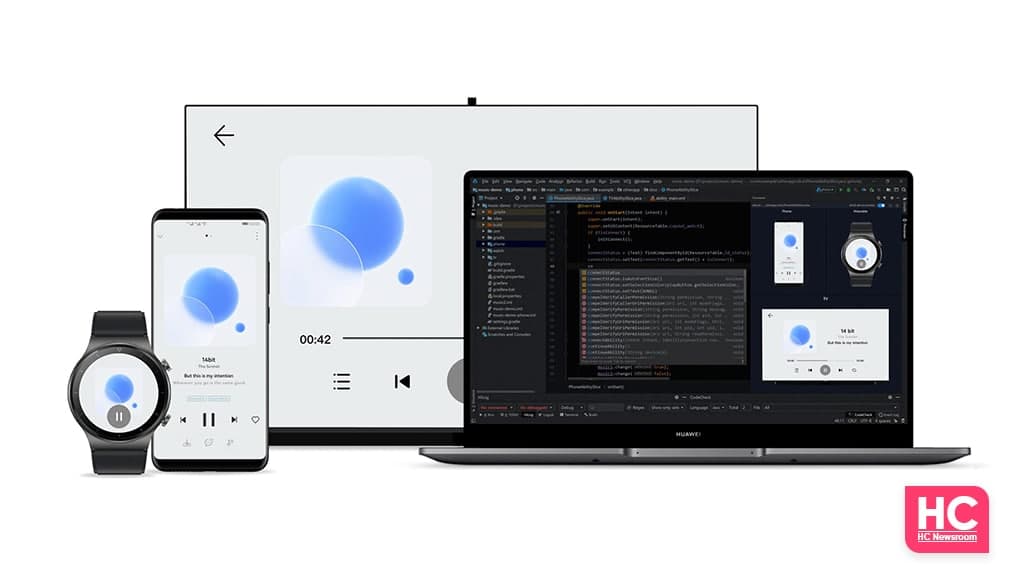HarmonyOS
Huawei DevEco Studio 2.2 Beta 2 adds stack, image analysis, compatibility test, and more

Recently Huawei released the Huawei DevEco Studio Tool 2.2 Beta 2 version that can be installed via an upgrade link in the notification section of the historical version. It’s a one-stop developer platform for Huawei developers that supported multiple functions such as coding, editing, debugging, and so on.
As described in the changelog, the company has added Linux burning support, stack analysis support, image analysis support, compatibility test, and more with this latest update. It can be installed on software including 64 bit Windows 10 and Ubuntu or above.
The new update not only brings newly added features but enhances the existing features and fixed some current issues also. It’ll provide more functions for the developers to explore every corner of an application.
Below, you can check some of the new features in detail-
Added Support For Hi3861 Linux Burning:
This release brings the Hi3861 Linux burning support, for better performance on the Linux system. The Hi3861V100 and BearPi-HMNano development boards were founded on the Hi3861 chip, which is a lightweight burning system.
The previous version only supports the Window platforms and the develops have to choose other ways for compiling and burning processes on Linux. After this update, the developer can easily copy the code on Linux for better performance.
Added Support For Stack Analysis and Image Analysis:
Insufficient or memory overflow are the two most common problems while developing a lightweight device. The developers need to pay extra attention to memory usage during development. Therefore, the latest release brings the stack and image analysis support.
Both the support works on the Hi3861V100 development board. Furthermore, the mirror analysis function analyzes elf file-memory usage meanwhile the stack analysis function is responsible for the following functions.
- Static binary files compilation
- Sack cost estimation
- Function call relationship diagrams
- Accurate static memory analysis
Method: Once the stack analysis and image analysis are complete, the analysis report can access by entering the navigation bar in DebugTool. The beta 2 updates added new buttons for image analysis and stack analysis.
Added Support For Application Compatibility Testing:
The application compatibility test ensures a stable operation of partners’ devices that runs on HarmonyOS. After integrating a uniform interface and market experience, the application undergoes various compatibility tests before the stable releases.
This new app compatibility test works on the Hi3516DV300 development board and can be performed on a Linux system. There is no need to replicate compile files on Windows workbench in the command line.
Method: The click button initiates the test after configuring several standards and saving the file. There is a Test button in the project task, pressing it will start the compatibility test and the result will be shown on the display window.
Added Emulator Function:
The new emulator function replaces the micro control unit or MCU in the physical system. It’ll let the developer verify the normal operation of the image file, which isn’t possible with the previous physical development board.
Method: The new simulator carried a mirror run that can be initiated with the task icon in the project tasks after compiling the build task.
- While Importing a project, MCU select arm_virt
- In the generated template configuration page, it prefers build-version
Huawei DevEco Studio Beta 2 Changelog:
Newly Added Features:
- Linux burning function based on Hi3861V100 and BearPi-HMNano development board, realizing one-stop editing, compiling, and burning operations under Linux environment
- Stack analysis and image analysis functions based on the Hi3861V100 development board to help developers solve memory and other problems
- Application compatibility test function based on Hi3516DV300 development board
- Emulator function
Optimized Existing Features:
- When the Hi3516DV300 standard system is burned, the burn file configuration information is adapted, and the developer does not need to manually configure the burn file information
- Based on the Hi3861 chip development board, a variety of programming methods have been added, and the appropriate method can be selected according to the hardware conditions
- Added prompts after successful installation on Windows platform to prevent developers from not knowing the results of the installation
- DevEco Studio Tool supports English and Chinese switching
Fixed Current Issues:
- A problem that the Hi3516DV300 standard system failed to prompt is that the file is too large to burn through USB
- An issue that caused DevEco Device Tool to fail to install when users installed Python 3.9
- The terminal error message is displayed in hexadecimal and cannot be located according to the log
- Home interface problem in DevEco Device Tool where it may have a black screen and cannot be used
- Fixed the problem that DevEco Device Tool could not be installed after the developer installed Python.






